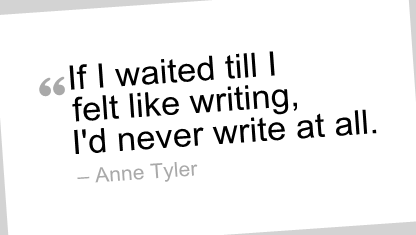 |
| Image Courtesy: Google |
In this glorious chaos of what to listen to,
and what not to, I would like to invite your attention to the fantastic idea
called “good writing.”
I am aware that one of the areas, a person
coming to WGT might be looking for, is insights from personal experiences of
other authors. Due to that very purpose, I would like to share an experience of
mine here, in this ‘internet coffee house’ of a blog, as author and editor Scott Bury remarks.
Good writing is an imperative every writer
pets with in one’s consciousness. Consequently, there are several myths
circling this idea.
 |
| Image Courtesy: blogs.denverpost.com |
Stephen King once remarked that creative
writing could never be taught in schools. He was telling the truth about ‘good
writing’ too. Perhaps the biggest impediment in being a creative writer (and a
good one in that) is the only boon capable of propagating one in the direction
of a successful writing career—Inborn
talent. But what about you, a person blessed with the gift of weaving extraordinary
tales out of ordinary events in life? Are you born with “Inborn talent”?
What might be the secret of being a good
writer, of selling more stories than the number of tickets for the next
Hollywood blockbuster; of being the most loved and respected man of letters? The
surest way to success in this dimension is perseverance.
As a writer, one might come across many external
obstacles; obstacles from our day-job, obstacle in the name of family, etc.
These obstacles, sometimes with our knowing and sometimes unknowing, sucks out
what could be described as the surest key to becoming a good writer. I would
never suggest one must wait for the right moment to pen a story or to edit a
previously written manuscript. The right time for a writer is NOW.
Remember, you are here because you love
reading about writing and want to learn a few techniques on improvising your
writing. You have listened to your call, by coming here. You have that inner
radio inside of you that could tune into the cosmic energy that is the Source
of all Creation.
If you arrived here with a desire to learn,
I must tell you that you have the necessary ingredients in your DNA to make it
big as an author. You are in alignment with that dream that you have nurtured
throughout your life, of sitting on a table, signing books at one end of an
incredibly long line of people, simply because you are reading this article.
This is not a self-help forum. Still, I
would advice a new author to take perseverance as your measure when the path in
front of you is not visible, when you meet a dead-end. For example, think about
Dr. Viktor E. Frankl’s experiences in the concentration camp of Auschwitz. Had
he not been persevering, his future and the future of psychoanalysis itself
would have been something else. In such a situation, perseverance means you
trust your abilities to risk every other madness around you. It results from
trusting oneself. Dr. Viktor E. Frankl shares his experiences in the book
titled Mans’ Search for Meaning.
The craft of good writing also stems from
trusting oneself. However, I would also suggest you should not limit your trust
upon the blind faith that ‘whatever you do would be good’; or daydreams about
long lines of people waiting for your autograph. Although, it sounds almost naïve,
I must say that one must act in order to bring success into the world of
reality. This, I consider, is a valid thought for any aspiring writer. Most aspiring
writers never make it to the successful line of authors. The reason for that is
simple: most aspiring writers only aspire. Their aspirations are not strong
enough to manifest themselves into material reality.
The next best thing to do in order to bring
in your ‘good writing’ is to trust your own intuitions and write steadily. By
carrying the purpose, and following the discipline required to finish specific
writing projects, you are sure to succeed. In writing-life, failure has only
one meaning—stopping a work. This means, essentially that if you don’t stop,
you never fail.
About The Author:
Anu Lal is the author of Wall of Colours and Other Stories,
Book-1 in the Hope, Vengeance, and History Trilogy. He resides in India. His
second book You Should Know How I Feel has been
a bestseller in Amazon India.
Author Page: Here









